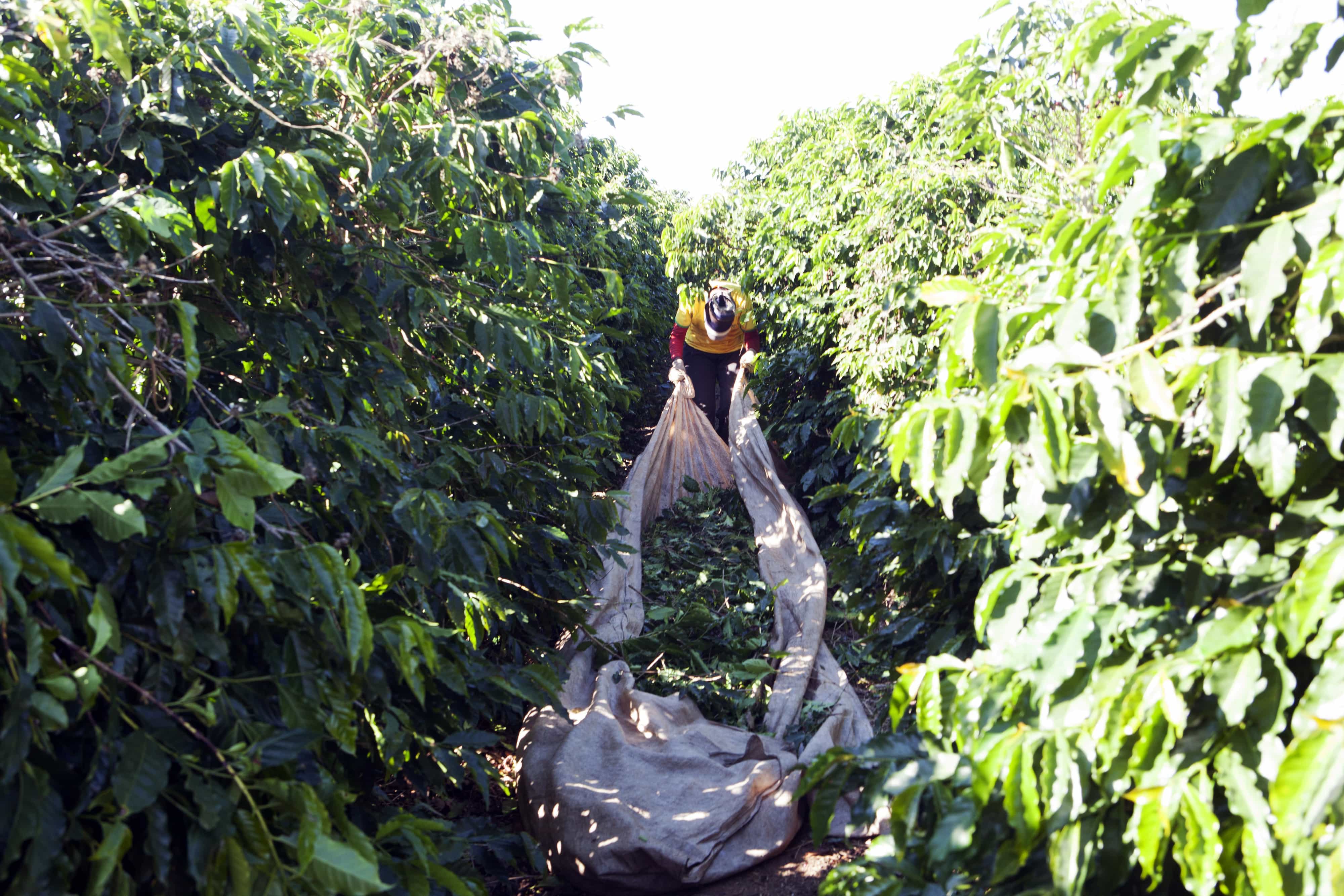
Debt bondage, child labour, deadly pesticides, a lack of protective equipment, and workers without contracts. Danwatch has been on assignment in Brazil and can prove that coffee workers in the world’s largest coffee-growing nation work under conditions that contravene both Brazilian law and international conventions.
Danwatch has confronted some of the world’s largest coffee companies with the facts surrounding these illegal working conditions. Two coffee giants admit that coffee from plantations where working conditions resembled slavery according to the Brazilian authorities may have ended up in their supply chains.
This means that when you buy coffee in the supermarket, you risk taking home beans that were picked by people whose accommodations lack access to clean drinking water, or by workers who are caught in a debt spiral that makes it practically impossible for them to leave the coffee plantation.
Danwatch accompanied the Brazilian authorities on an inspection and was able to trace the sale of coffee from some of the other plantations where the authorities has characterised conditions as analogous to slavery.
Danwatch can therefore document that coffee from plantations with slavery-like conditions was purchased and resold by middlemen who supply the world’s largest coffee companies.
Nestlé and Jacobs Douwe Egberts corporations together account for about 40 % of the global coffee market. Their brands include Nescafé, Nespresso, Dolce Gusto, Taster’s Choice, Coffee Mate, Gevalia, Senseo, Jacobs, Maxwell House and Tassimo. Both companies admit that coffee from plantations where working conditions resembled slavery may have ended up in their products. Nestlé also admits to having purchased coffee from two plantations where the Brazilian authorities freed workers from conditions analogous to slavery in July 2015.
[INSERT_ELEMENTOR id=”8121″]
Both Nestlé and Jacobs Douwe Egberts have adopted codes of conduct in which they require suppliers to adhere to a variety of international human rights conventions and to core conventions of the International Labour Organisation.
Following Danwatch’s investigation, both companies acknowledge that there is a need to do more to resolve the labour issues that affect Brazilian coffee cultivation.
“We are determined to tackle this complex problem in close collaboration with our suppliers, whom we have contacted”, Nestlé said in a written statement.
Jacobs Douwe Egberts stated that in the wake of Danwatch’s enquiries it had been in touch with all its suppliers to ask them to explain what steps they are taking to ensure that they do not purchase coffee from plantations with slavery-like working conditions.
[INSERT_ELEMENTOR id=”8857″]
Aside from the problem of slavery-like working conditions, the most serious problem for coffee workers on Brazilian plantations is that it is legal to spray the coffee with pesticides that cause illness and are potentially lethal – and that are forbidden in the EU.
Some of the pesticides are so toxic that merely getting them on your skin can kill you. Nevertheless, many workers spray the coffee bushes with pesticides without using the protective equipment that is required by law.
“These chemicals are outlawed in Denmark and the EU because they are extremely toxic and can cause serious acute and long-term health problems”, says Erik Jørs, a senior consultant on the Clinic of Occupational and Environmental Medicine at the University Hospital and the University of Southern Denmark in Odense.
Erik Jørs has studied the use of pesticides in developing countries for many years, and explains that researchers suspect that the substances damage reproductive systems and cause Parkinson’s-like symptoms such as coordination problems and trembling hands.
Danwatch has interviewed Brazilian coffee workers who have applied pesticides without sufficient protective equipment, and who today complain of hands that won’t obey them and feet that feel as though they are asleep.
Danwatch’s investigation also shows that child labour is still a problem on Brazilian coffee plantations. At an inspection observed by Danwatch in July 2015, two boys aged 14 and 15 were found to have been picking coffee and freed from slavery-like working conditions.
Brazilian authorities lack statistics showing how many children work on coffee plantations, but in Minas Gerais, Brazil’s largest coffee-producing state, 116,000 children aged 5-17 years old worked in agriculture in 2013. Of these, 60,000 were under 14 years old, according to the Brazilian Institute of Geography and Statistics (IBGE), a government agency.
– Read more about the problem of child labour in Brazilian coffee cultivation.
In addition to the serious issues of child labour, deadly pesticides and slavery-like working conditions, Brazil’s coffee industry is beset by a number of other problems. Brazilian labour organisations estimate that as many as half of all coffee workers work without contracts, and mention other challenges, such as underpayment and serious workplace injuries, as well.
[INSERT_ELEMENTOR id=”20092″]
[INSERT_ELEMENTOR id=”20100″]